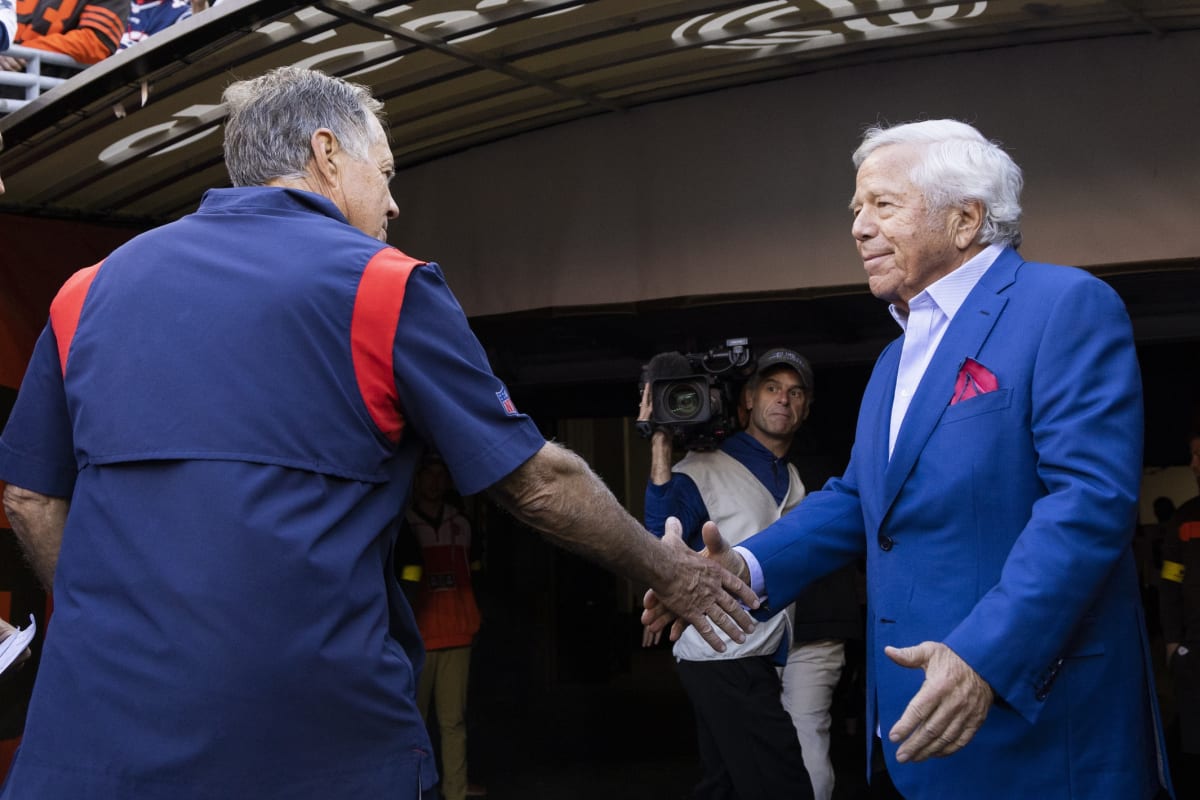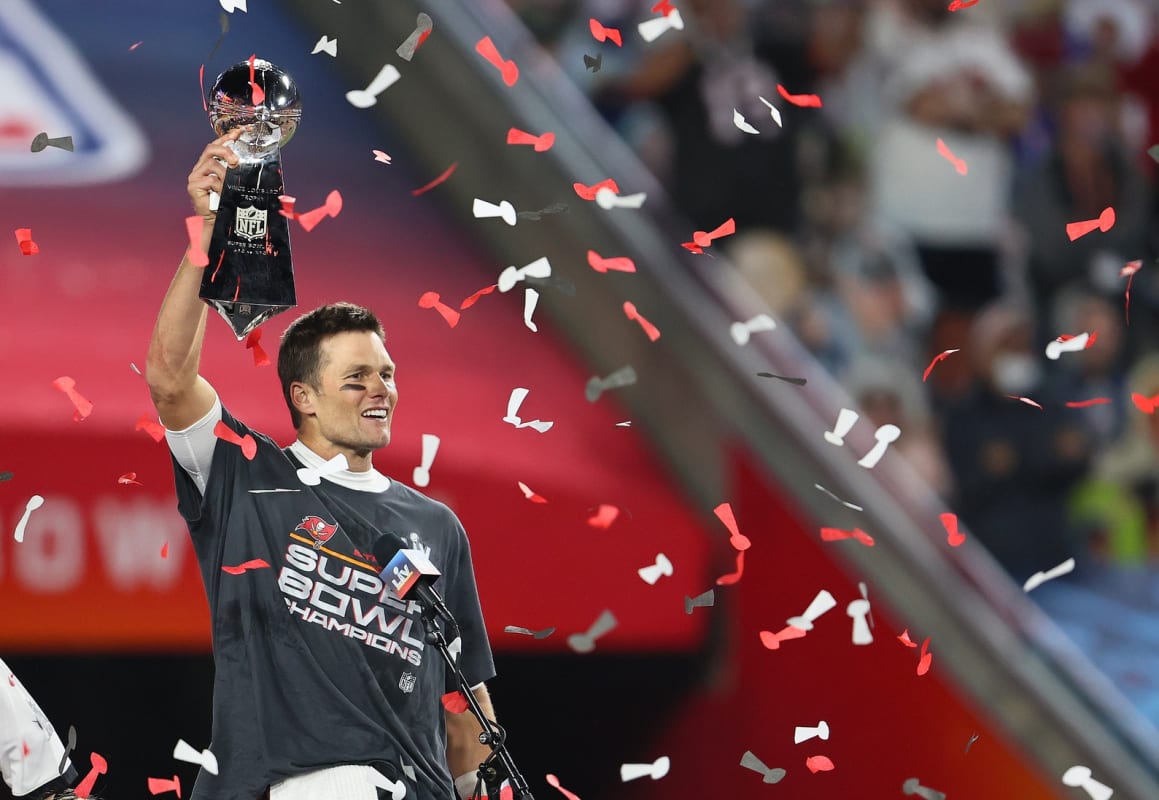At the end of last week, before the Patriots sunk to 1–5 with a loss to the Raiders, I was a guest on 98.5 The Sports Hub in Boston to deliver a verbal mea culpa for picking the Patriots to win the AFC East. It is something I believe we should all do when we go out on a limb, to communicate with the public that we are human, we make mistakes, there is a reason behind the mistake and we’re not just milking them for a few easy clicks. I explained my thought process—opposing coaches still believed that Bill Belichick had his fastball defensively and that Bill O’Brien’s time at Alabama would deliver him to New England with a cutting-edge offense—and accepted the fact that, for maybe another year or two, the massive undertaking of predicting all 272 games in June would be taken a little less seriously (if that were possible).
But the hosts, Fred Toucher and Rich Shertenlieb, asked me a fascinating question during the gentle-natured dressing down: Would you trade for Belichick if he were available? My brain exploded at the thought, not in a smug, James Franklin this-is-ridiculous-kind-of-way, but because the discussion is so rich with various pockets of history, theory and future predictive analysis. I don’t think Robert Kraft would ever trade Belichick. But I sure as hell would like to write about it.
To me, the central driving force behind this hypothetical move is so interesting because it embodies the ethos of the Patriot Way that Belichick himself created. While I do think Belichick is a far more nurturing and emotionally intelligent person than he is portrayed to be, there is a certain degree of callousness to his operating procedure, and there has to be when you are running a business. Essentially: If you are not operating within the confines of his system, you are expendable. One could make the argument that Belichick is no longer operating within the confines of the stated system.

Scott Galvin/USA TODAY Sports
What if Kraft came to view Belichick just like Belichick came to view any of his players who were swapped out or discarded during their times in New England? What if Kraft had applied that same logic to his coach and general manager, and found a way to better his franchise via some much-needed draft equity like Belichick did with Jimmy Garoppolo, facilitating a trade that would allow his best asset to flourish at the end of his career elsewhere.
First, we would need to talk about compensation.
Here are the most recent coach trades, dating back to Belichick’s own move from the Jets to the Patriots:
- Sean Payton from the Saints to the Broncos: 2023 first-round pick, ’24 second-round pick.
- Bruce Arians from the Cardinals to the Buccaneers: 2019 sixth-round pick for Arians and a ’19 seventh-round pick.
- Herm Edwards from the Jets to the Chiefs: 2006 fourth-round pick.
- Jon Gruden from the Raiders to the Buccaneers: 2002 first- and second-round picks, ’03 first-round pick, ’04 second-round pick.
- Bill Belichick from the Jets to the Patriots: 2000 first-round pick, ’01 fourth-round pick, ’01 fifth-round pick and ’02 seventh-round pick.
If Payton and Gruden, both coaches who were not nearly as successful as Belichick, commanded first-round picks, I would imagine that there would have to be a first-round pick attached in a trade for Belichick, although there are some complicating factors.
One would be that Belichick will be 72 before the start of the 2024 season. An organization hoping to install the full breadth of the Patriot Way would need to take into account a truncated installation. Romeo Crennel, at age 73, was the oldest coach in NFL history. While I am confident in the long-term cognitive abilities of Belichick (I did ask a doctor about this!), I am less confident about a coach’s willingness to change and successfully alter a philosophy after having spent decades creating their version of an ideal structure and setup.
Another would be that the Patriots have flatlined since the departure of Tom Brady. Payton, another coach operating without the quarterback who defined his best years (Drew Brees), is also struggling. Much like the Urban Meyer tenure poisoned the prospect of an NFL team hiring a college coach for a time (until someone hires Deion Sanders), this very small sample size may also turn off teams to the idea of a coach who is going to come in and command a very large amount of oxygen and reshape the power structure.
Another would be that, outside of Bill O’Brien, the Belichick coaching tree has not yielded much ripe fruit. As an organization, you would likely be inheriting whoever else would want to stay with Belichick and not some kind of replacement. I’m sure a lot of coaches would welcome the chance to work alongside Belichick, but if you were getting Belichick for a two- or three-year window, you would want some kind of succession plan. You would also doubt the validity of many succession plans.
And then there is an emotional component. Kraft watched Brady win a Super Bowl with the Buccaneers. Would he want to watch Belichick immediately make the playoffs with another team or even break a meaningful record with another team? I wrote about why I think Kraft is handcuffed to Belichick until he breaks the record, but we are talking about a legacy-minded 82-year-old billionaire. Does Kraft age sentimentally? Aggressively? Boldly? Does he ultimately desire to more firmly carve out his piece of the Patriot Way for himself and show that he can do it with someone else just like Brady? This soup of feelings would be such a swamp to wade through.

Matthew Emmons/USA TODAY Sports
So we’ve arrived at the point where you’re probably wondering why we’re still talking about this. It seems improbable from a likelihood standpoint, indefensible from a logistical standpoint and complicated from an optical standpoint. However, I’d like to make the one case I feel like we’re not making. I’d like to discuss what I think Belichick’s inherent value would be to a franchise.
If I were the owner of a very young team with very young coaches, I would trade for Belichick because I would want him as a kind of ombudsman or consultant who could also coordinate my defense. Not a traditional head coach but a coach emeritus. I know this sounds ridiculous, but the part of the Brady-Belichick relationship that we often overlook is the fact that Brady rose through that organization and got a shot in the first place.
In New England, Belichick was able to see through the political clutter. He was able to mercilessly shed dead weight and install an actual meritocracy. Now, that’s not what the Patriots eventually became, but that is what they were through their best years. I would ask him to do the same with my team. I would ask him to teach the coaches (read Greg Bishop’s feature on padding). I would ask him to grill them. I would ask him to review game film. I would want him everywhere and nowhere. I would want him as a resource.
As my colleague Albert Breer noted on the most recent MMQB podcast where I floated this idea, it’s not unlike what the Dolphins did with Belichick’s mentor, Bill Parcells. There are some novice owners, including the Josh Harris group in Washington, who are still learning the ropes. This could be a kind of modified hand-holding experience. How you might view the Parcells-Dolphins arrangement depends on your perspective.
If you’re thinking that’s not worth a first-round pick, I can understand the argument. But I also think there is this vast NFL middle class out there full of almost-great coaches, almost-great teams, almost-great organizations. While you could absolutely find a franchise-altering player at, say, pick No. 16 in the NFL draft, you could also gamble on something with a bit more of a sample size.
I have a hard time accepting that we are nearing the end of the Belichick era. As I wrote before, I think we are nearing the end of effectiveness for the roster-building style that was a hallmark of his greatest years. There is a difference. But a focus on duty, timeliness, details, fundamentals … there is a kind of timelessness to that.
Maybe that means the organization is just waiting for the talent to catch up with the next evolution of the Patriot Way. At this rate, we could see Caleb Williams in blue, red and white. How quickly could he change our disposition? How quickly could a player like him change the perception of any organization? Would we be laughing off the idea of a trade then?
Or, maybe there is a team willing to find out how quickly it could go from average to good, or from good to consistently great. I don’t think there’s anything funny about seeing what Belichick would cost.







